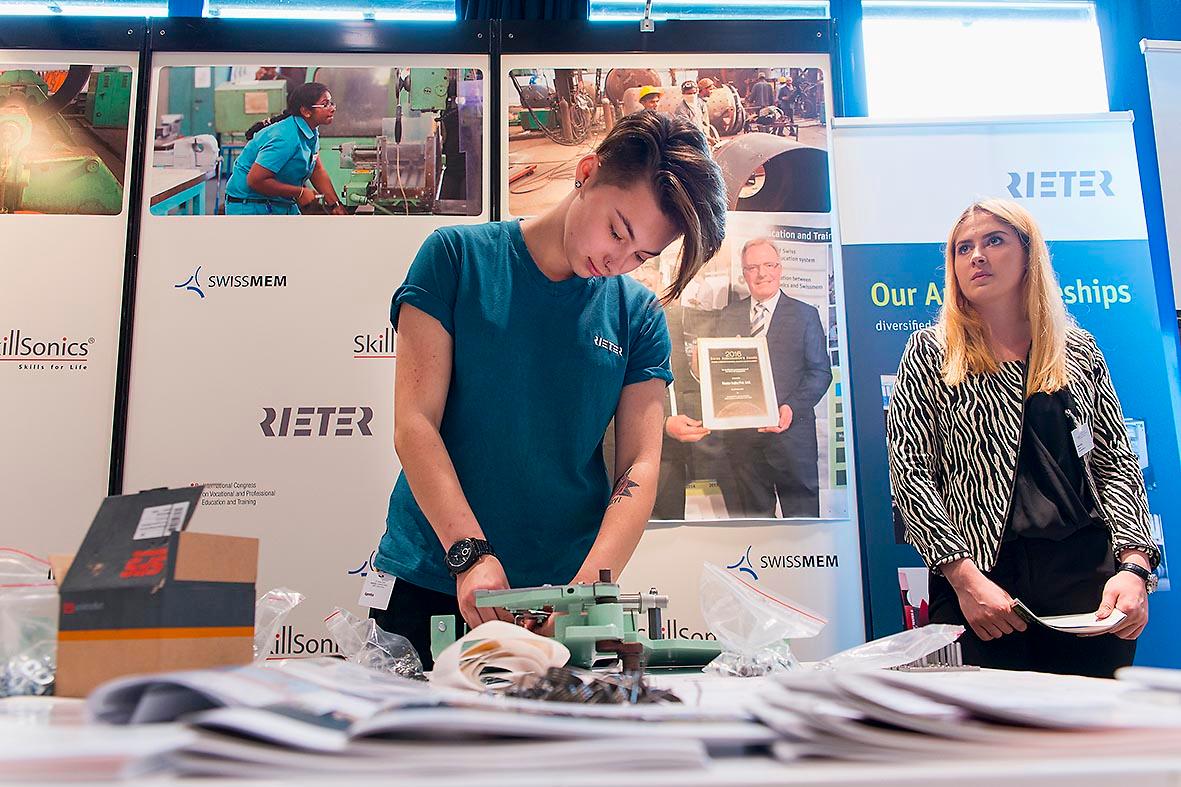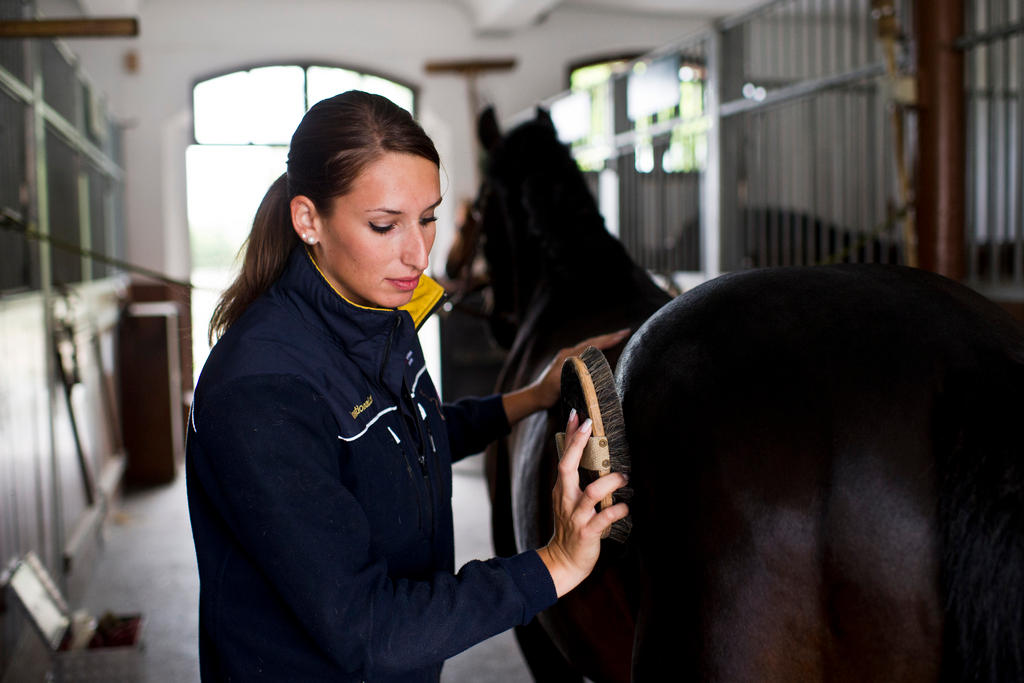Swiss vocational training serves as a model for others

Singapore, the United States and Mozambique: three countries, three very different apprenticeship experiences. What do they hope to learn in Switzerland this week at a key congress on vocational and professional training?
While Singapore, with an unemployment rate of 2%, is looking to expand its educational options with vocational training, Mozambique, which has 25% unemploymentExternal link, sees apprenticeships as a way of giving youth skills and jobs. The US has about 4% joblessExternal link, but an acknowledged deficitExternal link in skilled workers.
To find out how apprenticeships work in their homelands, swissinfo.ch contacted an expert from each of these countries attending the 3rd International Vocational and Professional Education and Training (VPET) CongressExternal link, which starts in Winterthur on June 6.
Switzerland’s own dual system, that combines education with an apprenticeship at a host company, is often held up as a model for others.External link
+ Read more about how the Swiss dual track system works here
Ong Ye Kung, Minister for Education, Singapore

The ministerExternal link, who is not unfamiliar with Swiss-style education – he holds an MBA from the Institute of Management Development in Lausanne – says that he is honoured to speak at the event. “Switzerland and Singapore are small nations, tapping on the wider region and the world to earn a living, and placing great emphasis on developing our people. While the objective is the same, our approaches and policies towards education and talent development are different due to our respective unique historical and cultural circumstances. This makes for rich mutual learning. Over the years, successive Education Ministers have visited Switzerland, almost on an annual basis, to learn about your system.”
+ Swiss president visits Singapore to talk vocational training
Ong says however that a change in mind-set is still neededExternal link towards vocational training in Singapore. While some progress has been made, we need to encourage more companies to train their workforces, he says. Among the initiatives he cites that involve employers are the new apprenticeship-based technical diplomaExternal link at the Singapore Institute of Technical Education and the SkillsFuture programmesExternal link (earn and learn; work-study degree programme).
“At the heart of it, our aim is to develop a system of diverse pathways, where our young can choose from options within the spectrum of academic learning and apprenticeship-based vocational training, and find a path that suits them, plays to their strengths, and helps them chart fulfilling careers.”
Kathryn P. Castelloes, Apprenticeship Director, North Carolina Community Colleges, US

CastelloesExternal link oversees apprenticeships programmes in North CarolinaExternal link and ensures they meet state and federal requirements. The state’s model combines on-the-job learning and classroom instruction across a variety of apprenticeships and ages, including for veterans. More than 600 employers pay apprentices across the state, but North Carolina wants to expand this further.External link
Castelloes hopes to take back innovative ideas and best practices from the congress. “I would also like to learn more on potential policies that could be utilised in my state, such that more apprenticeships could be adopted within our educational systems,” she says.
Companies, such as precision engineering company Daetwyler, run apprenticeships along the Swiss model in North Carolina. “Daetwyler began apprenticeships in 1995 and continues to be a leader for apprenticeships throughout the nation. The Swiss system is being viewed more and more as a model to be duplicated by others. The system is gaining more attention, increasingly promoted as more companies become involved,” Castelloes notes.
+ swissinfo’s 2015 visit to Daetwyler in North Carolina
Also speaking at the congress will be US State Secretary of Education, Betsy DeVos. Her presence comes soon after the Trump administration announced a multi-million boostExternal link for apprenticeship and career/technical education programmes.
Mzikazi Ntuli, Grant Administrator and Programme Development Advisor, ADPP, Mozambique

“The growing problem of youth unemployment and underemployment is one of the main socio-economic development concerns of most African governments. Without job-related skills, youth and adults cannot benefit from the employment opportunities that offer a decent income,” says Ntuli. The apprenticeship situation in her country is not well-developed, with most opportunities being offered by the private sector and NGOs like hers.
Vocational education is currently being reformedExternal link in Mozambique. This should result in a more demand-led training system, providing people with more market relevant skills and more economic opportunities, Ntuli says. Nearly 80% of the labour force has not completed first level primary education, according to government figures.
Ntuli’s congress contribution will be, in her words, an “authentic African success story”: talking about two ADPP -backed projects to boost employability and entrepreneurship among young people, especially women, in Mozambique. One is focused on delivering market-led vocational training and the other on using open, distance and technology based education to improve employability and entrepreneurships for women and girls victims of child early and forced marriage.
Apart from learning from other apprenticeship systems, Ntuli also hopes to find out how people have maximised technology to provide professional skills via vocational education programmes. “In Africa we are starting to bring technology into education and training. I want to learn what has worked and what were some of the key success factors,” she says.
*All interviews were conducted via email
VPET 18
swissinfo.ch is the media partner of the 3rd International Congress on Vocational and Professional Education and Training (VPET 18) which runs from June 6 -8, 2018.
Around 425 people from industry, politics and education are expected to attend, from around 80 countries. The congress aims to “engage in open discussion and exchange good practices”.
The motto is “Skills for Employability and Careers” – which will focus on the current challenges faced by the economy. Topics include digitalization, lifelong learning and curricula development. Not missing, of course, are the apprentices, who will present aspects of their training in the Skills Village.

In compliance with the JTI standards
More: SWI swissinfo.ch certified by the Journalism Trust Initiative













You can find an overview of ongoing debates with our journalists here . Please join us!
If you want to start a conversation about a topic raised in this article or want to report factual errors, email us at english@swissinfo.ch.